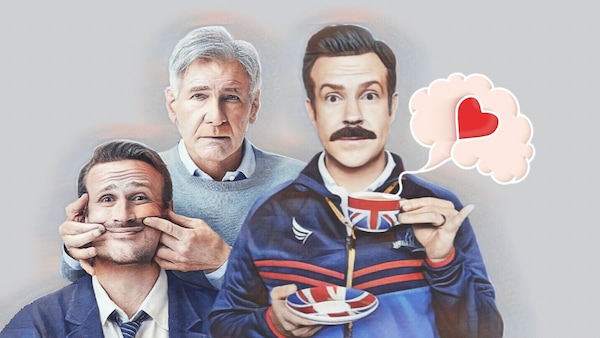Newsletter | How Apple TV's Shrinking & Ted Lasso Couch Therapy
Shrinking and Ted Lasso are anomalies — likeable shows that believe in studying the bandage rather than surgically interrogating the wound. Manik Sharma writes.

Last Updated: 06.58 PM, Mar 29, 2023
This column was originally published as part of our newsletter The Daily Show on March 29, 2023. Subscribe here. (We're awesome about not spamming your inbox!)
***
“I NEEDED to hit rock bottom, and you wouldn’t let me,” Jimmy tells his best friend Brian in Apple TV’s illuminating, feel-good comedy about dealing with grief and life’s everyday challenges. No, I’m not talking about Ted Lasso, but about the other series that the streaming service has seemingly hit a home-run with — Shrinking. Ted Lasso’s breezy, uncomplicated appeal was a miracle, but it would have been impossible to conceive of a second rejoinder to that world of gooey, inoffensive, do-goodness. It’s baffling really then, that in the age of true-crime docs, dreary dystopian speculation and foul-mouthed media families, two shows about mental health and the little things in life have gained more than just must-watch status: They have normalised grief and therapy as the unlikely site of comedy.
While Ted Lasso’s approach to emotional vulnerability is a sort of schema that casually washes away roadblocks with cheery wistfulness, for Shrinking, grief, frustration and angst are direct subjects. As the name suggests, the show follows the practice of three psychiatrists who share an office, lives, some banter and much more in what is possibly the closest anyone has ever come to humanising the person who sits on the couch and listens. Shrinking’s greatest coup, however, isn’t the eerie yet goofy writing, but the casting of one of Hollywood’s biggest actors as a grumpy grandpa-like figure with Harrison Ford. Ford is majestic as the cold, at-times snide practitioner of a brand of mental gymnastics that helps patients as much as it ruffles the feathers of those around him. While the likeable Jason Segal (Jimmy) is at the heart of the show, it’s really Ford who has his cake and eats it too with delightful ease.
There are obvious parallels between both these shows. Brett Goldstein, who plays loose cannon Roy Kent in Ted Lasso, is the co-creator of Shrinking alongside Segal. The writing on both shows exhibits a restrained quality, the mix of serious ideas riddled with the casual charm of someone experiencing or discovering depth for the first time. It’s disarming, because no matter how many times we do it, grieving feels like a painful new journey, one that begins by obliterating your memory of the last. It’s probably why depression and sadness are approached with childlike candour in these shows, to affirm the idea that no one — not even the guys making notes on the couch — necessarily know better than you. Ted Lasso might have found a way to say it indirectly, but in Shrinking’s messy, unreliable professionals, we see how fragility cuts both ways. Even those who repair the human psyche are at times in need of fixing.
Shrinking to an extent also feels like the natural next step after Lasso. In Ted Lasso, the chief provocation for multiple seasons has been everyone’s reluctance to admit to the need for, and seek, professional help. Even Lasso himself, the arch optimist who mollifies through his inappropriateness, is hesitant to admit to the science behind it all. It’s expected of a dreamer to believe that the tide they are swimming against will eventually turn back. Except, mental health doesn’t work that way. It chips away at you until you are the remains of a rock that has been battered by wave after wave of quiet, unnoticed despair. Quite simply because it’s a rock. It’s in Lasso’s DNA, similarly, to be the water that puts out the fire. God forbid if he himself were to go up in flames.
Shrinking borrows the concerns of Ted Lasso, and builds on them from the other side. Everyone’s happy to seek and offer help here, but human nature itself is so complicated and fickle that even woke solutions can’t always seem to draw the kind of celebratory results that therapy, or its preconceived image, is believed to exact. Not everyone does as is told, nor is everyone telling what needs to be done. It’s an inexact science, born out of instinct as much as it might seemingly be born out of psychobabble and theory. “I’m a psychological vigilante,” one of the counsellors quips at one point, which is basically hyperbole for ‘at least the intent is right’.
Both Shrinking and Ted Lasso are anomalies — likeable shows that believe in studying the bandage rather than surgically interrogating the wound. There is obviously some of the latter, but the idealism of both refuses violence, the pedestal of grim poetry it has come to occupy in the age of streaming. Instead, it’s in the escape, the ludicrous capacity for self-deprecation, the ability to both enact and endure grief as a form of intellectual purgatory, that these two shows have invented a medium. A medium where human emotion can be sublimated to represent a state, rather than a condition. A medium where tragedy is merely an interpretative choice, and can as easily yield a smile as it can nourish tears. Without one, the other might actually be meaningless.
